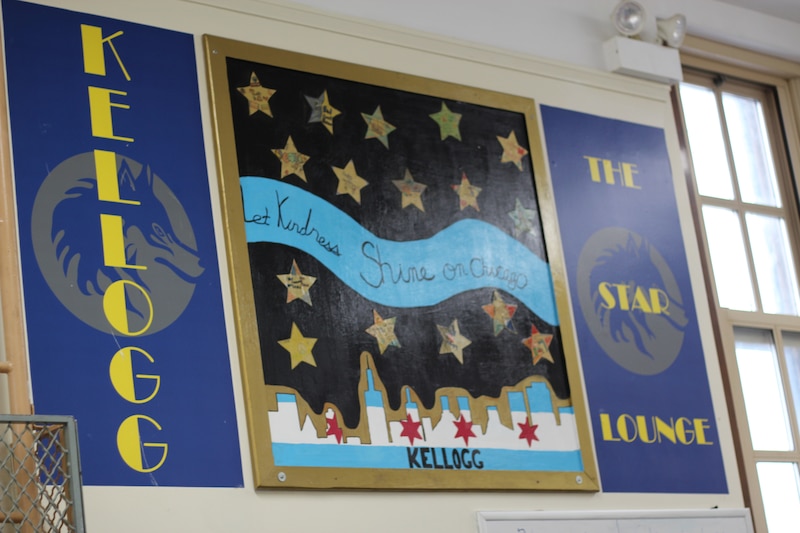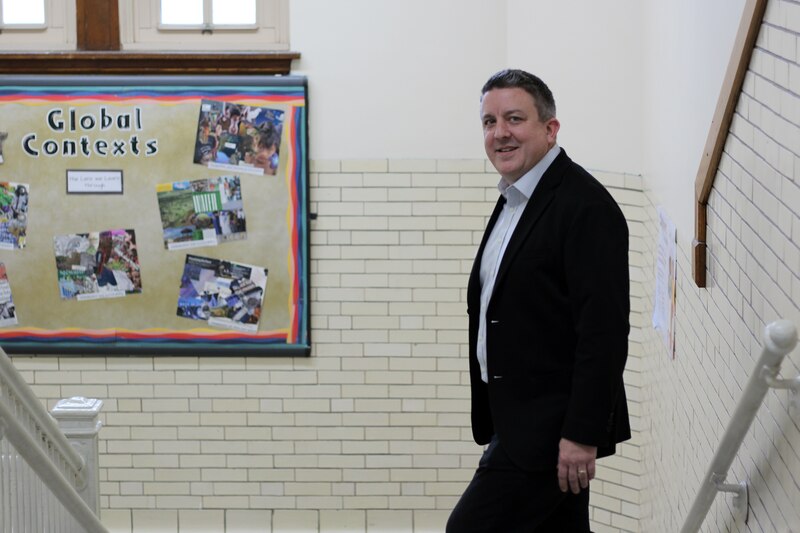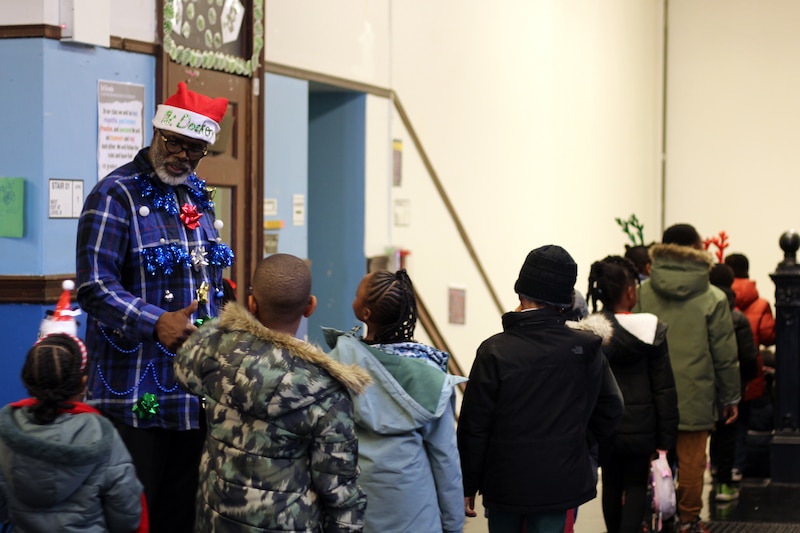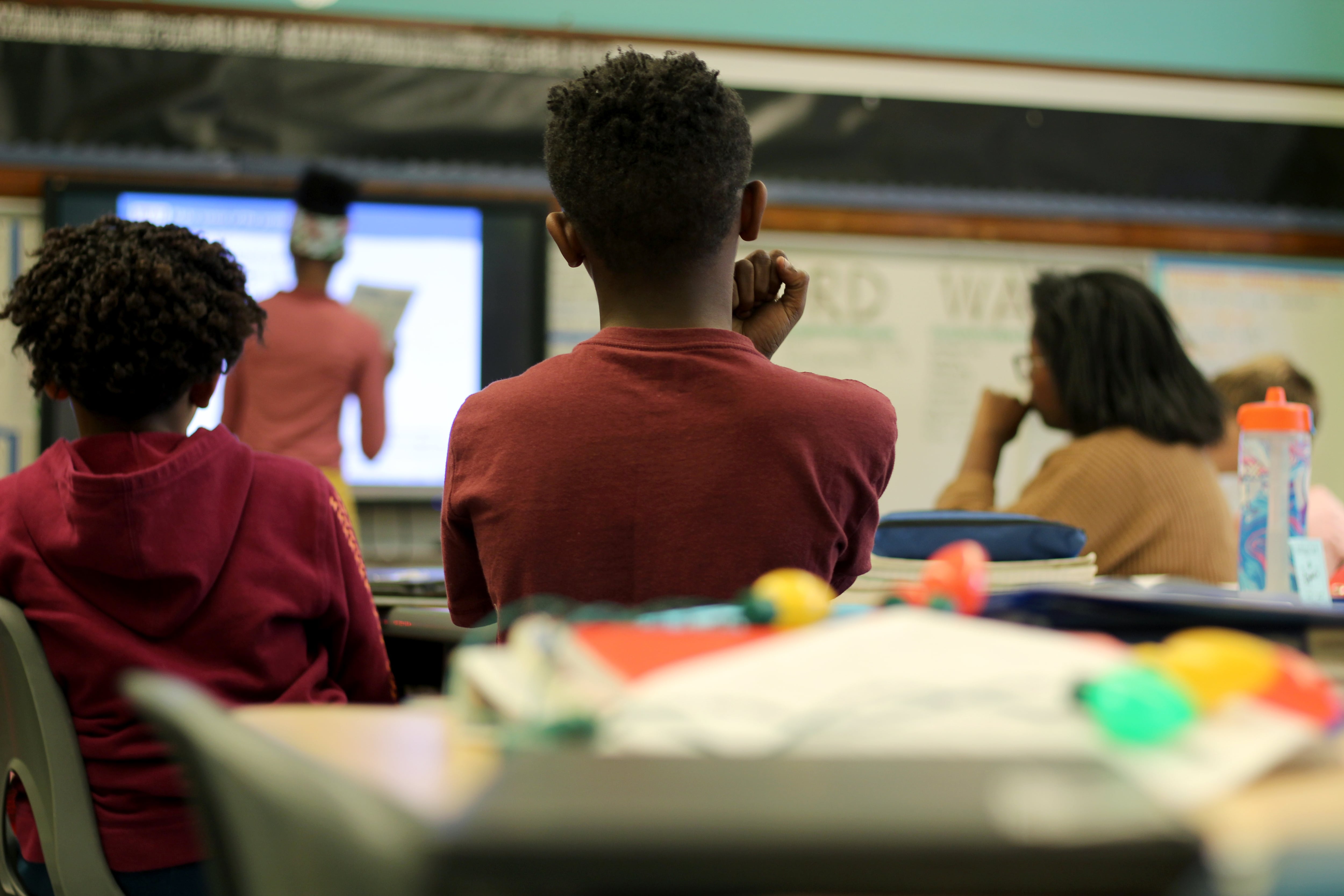Sign up for Chalkbeat Chicago’s free daily newsletter to keep up with the latest education news.
As part of a lesson on persuasive writing, fourth and fifth grade students at Edgar Allan Poe Classical Elementary School recently presented arguments in a classroom mock trial about intrusive coyote populations.
A Poe parent, who is an actual judge, rendered the verdict.
Five miles away, at Kate Starr Kellogg Elementary School, a class engaged in a similar lesson by writing persuasive letters to their principal to suggest improvements to the school. Kellogg principal Cory Overstreet proudly showed off the letters and visited the classroom to share his response.
Poe is a selective enrollment school in Pullman with a strong reputation in the city and Kellogg is an overcrowded neighborhood school in Beverly that was on the brink of closure about seven years ago. But the two South Side schools have a lot in common.
Both have majority-Black student populations, both are small (with approximately 250 students in grades K through 8), and this year both were among only five majority-Black Chicago schools designated as “Exemplary” by the Illinois State Board of Education.
The state designations have taken on new importance now that Chicago Public Schools has officially discontinued its own rating system in April 2023 after pausing it during the pandemic. In eliminating the system, officials called it “a punitive, myopic single-rating indicator.”
State data show Black students are significantly less likely to be enrolled in “Exemplary” schools across Illinois. Of the 369 schools statewide that earned the “Exemplary” designation, just seven have majority-Black student populations — five in Chicago and two outside of CPS.
Every year since 2018, as stipulated by federal law, ISBE evaluates every public school in the state then sorts them into five categories based on the results – Exemplary, Commendable, Targeted, Comprehensive, and Intensive. Schools in the bottom three categories get additional funding to improve.
“Exemplary” schools are the top 10% of all schools in the state based on overall performance. Growth and proficiency in math and reading scores, proficiency in science, graduation rates, and chronic absenteeism are the major indicators that determine a school’s designation, according to an ISBE statement.
This year 42 of Chicago’s 634 schools earned “Exemplary” status. Thirty are majority white, majority Asian American, or integrated.
Kellogg is the only majority-Black neighborhood school in CPS to earn the designation.
The other four “Exemplary” majority-Black schools – Poe Classical, Bronzeville Classical, McDade Classical, and Franklin Elementary Fine Arts Center – are either selective enrollment or magnet schools.
State officials said the disparity is tied to broader inequities.
“Statewide, education systems, which are deeply interconnected with broader state and local systems, are producing lower rates of growth, the lowest rates of proficiency, the lowest graduation rates, and the highest chronic absenteeism for the state’s Black students,” read a statement from ISBE. “Schools with high percentages of students of color are also more likely to experience teacher vacancies and higher teacher and principal turnover.”
Although 2023 is the first year Kellogg has earned “Exemplary” status from ISBE, the school was ranked as a Level 1+, the best possible designation, under CPS’s now-discontinued School Quality Ratings Policy.
CPS’s new accountability policy, called Continuous Improvement and Data Transparency, “considers both inputs, such as student daily learning experiences or adult capacity and continuous learning, and outputs, such as student growth to proficiency, among many other indicators,” according to a CPS statement.
It is set to be published in the fall of 2024 and adopts the state’s designations in lieu of level ratings.
In other words, the ISBE designations are the accountability system Chicago families and the public now have for scrutinizing how well a school is doing.
So what makes majority-Black schools like Kellogg and Poe exceptional?
Overstreet cites Kellogg’s high number of long-serving teachers and the school’s focus on social and emotional learning, an educational method that helps students develop things like relationship skills, self-awareness, and responsible decision-making.
He also credits Kellogg’s Personalized Learning curriculum through which educators create education plans according to the strengths and needs of individual students. Kellogg partnered with LEAP Innovations to adopt the curriculum before the district formalized its own Personalized Learning department in 2014.
But, he knows that many schools could cite similar strategies.
“I’ve worked in majority not-white schools pretty much my whole career, and I can tell you that in all the schools, including Kellogg, the teachers are working their tails off,” said Overstreet. “So I can’t really say why Kellogg is the only one.”
The thing he guesses might tip the scales? The parents, says Overstreet.
That’s something else Poe and Kellogg have in common. Principals and parents at both schools agree that parent involvement — and the socioeconomic privilege of the communities they serve that allows parents to be involved — might be the secret ingredient that sets them apart.
“I think we have a higher percentage of students or parents who are aware of what’s necessary to give their students the best advantages for success in school, and they stay with us throughout,” said Poe principal Eric Dockery.
Whether in the form of a parent and professional judge presiding over arguments for a lesson on persuasive writing at Poe or parents at Kellogg organizing to save the school from closure and demanding capital improvements, when parents get involved, they “extend learning,” said Dockery.

How the #SaveKellogg movement created a parent community
When Kellogg parent Kenya Mercer learned her son’s school was designated as “Exemplary” this year, she was not surprised.
“They have excellent test scores, the eighth graders are going to great high schools within the city,” said Mercer, who is an active member of the PTA at Kellogg, a neighborhood school in Beverly on Chicago’s far southside.
Mercer chose Kellogg for her children over selective enrollment schools where they had gotten offers.
“It’s a phenomenal, great school,” she said.
Despite its long-running strong academic performance, Kellogg has endured some hardships over the years.
Even with Kellogg’s Level 1+ rating in the old CPS system, rumors that misrepresent the school’s academic record still persist.
“There’s just this belief that if a school is Black it’s not going to be as good,” said Overstreet. “I think you get that anywhere – Beverly, Morgan Park, anywhere in the city, anywhere in the state.”
In 2016, 19th ward Ald. Matt O’Shea and State Sen. Bill Cunningham proposed a plan to alleviate crowding at one of the ward’s schools by merging Kellogg, which had seen a dip in enrollment at the time, with another nearby neighborhood school, Elizabeth H. Sutherland Elementary. Under the plan, Keller Regional Gifted Center would have moved into Kellogg’s building and Keller’s building would go to then-overcrowded Mount Greenwood Elementary, a majority white school at the edge of the city limits.
Kellogg parents saw this as an attempt to close Kellogg and replace the neighborhood school with Keller, a school that enrolls students based on test scores rather than neighborhood boundaries.
So they fought back. They organized along with other ward schools and community members and conducted a march through the ward, Kellogg alumni showed up at meetings about the proposal and spoke out against the plan, and parents and students spoke at Board of Education meetings. Some of those speaking out raised concerns that there may be a racist component to the plan, since Kellogg, the only majority-Black school associated with the plan, would be the school being closed.
The movement made headlines and eventually the plan was killed and Kellogg was saved. Mt. Greenwood received a new annex in 2017, the third addition at the regularly overcrowded school since 2011.
But the energy from the #SaveKellogg movement was still crackling. Parents who had organized together were in more communication than ever and felt empowered to demand more for their school, said Kellogg parent Emily Lambert who was a Local School Council member at the time.
“I do think that the #SaveKellogg experience did kind of reinvigorate [the school] after a lull,” said Lambert. “And did lead to a very strong group of parents who were very committed.”
Today, Kellogg is officially designated as “overcrowded” by CPS, according to the 2023 CPS Facilities Master Plan.

Along with principal Overstreet, that contingent of parents pushed for several capital improvements at Kellogg, including an addition to make more space at the 80-year-old school, where there is no kitchen and the small gymnasium serves as gym, auditorium, and cafeteria, as well as occasionally a voting center and during the pandemic a care room for sick kids. The stage in the gymnasium is currently used for storage.
The community gained several smaller improvements for the school worth about $2.4 million but no addition to the building. The mobile unit that had been built twenty years prior, however, was upgraded.
Today, Kellogg has an average class size of 30, according to ISBE. Some parents have expressed frustration about the situation.
Parent Kenya Mercer says because of the strong communication between parents, staff, and even students, she’s not too concerned about the overcrowding affecting student learning.
“The biggest thing is this community piece,” she said. “Everybody is holding each other accountable including our kids holding each other and their peers accountable and their teachers.”
She’s hopeful that the “Exemplary” designation will help the Kellogg community advocate for physical improvements and more enrichment programs for the school.

Selective enrollment doesn’t mean it’s ‘Easy Street’
The first thing Poe Principal Eric Dockery noted about the school’s ISBE “Exemplary” designation, is that a lot of other great schools “get left out.”
“It’s such a big range for commendable and such a small range for exemplary,” he said, pointing to a chart showing the distribution of the five ISBE designations on his computer monitor. “Whenever you take the 10% of something, you’re going to exclude some.”
As a selective enrollment school and a National Blue Ribbon School, a distinction by the U.S. Board of Education recognizing high-performing based on academic performance and closing education gaps, Poe is no stranger to the upper echelon.
Dockery, who previously worked at a school in Englewood that was among the 50 CPS schools that closed in 2013, understands that as a selective enrollment school, Poe is more likely to draw families who are familiar with the selective enrollment process and parents who have higher levels of education themselves and are more financially capable of being involved in their children’s schools.
This, he said, is likely part of the reason some of the broader educational inequities that Black students tend to face across the state seem to be largely erased for Poe’s 87% Black student population.
Although Kellogg must guarantee a seat for any student within its neighborhood boundaries, the school’s boundaries are in the Beverly neighborhood, where the median household income is approximately $113,000, according to the 2017-2021 American Community Survey five-year estimates. Still, 39% of Kellogg’s student population is low-income, according to state data.
Families who apply to Poe, said Dockery, are often doing many of the things that help prepare their kids for academically advanced paths – taking them to museums, reading to them every day, enrolling them in preschool programs and enrichment activities – and they probably have the money to do so.
That explains part of Poe’s success, but it’s not the whole picture, he said.
“Just because we’re selective enrollment, that doesn’t mean that it’s just Easy Street and we don’t have to do any work,” he said.
While CPS has always been supportive of Poe, Dockery said, the school isn’t swimming in mountains of money. According to state data, 37% of Poe’s students come from low-income families.
“We’re too poor to be rich and too rich to be poor. So we don’t get Federal Title I [status]. We’re not that poor, but we’re not rich enough that our parents could just write a check and give us everything that we want.”

According to the school’s own assessments of student readiness when they enter the school in kindergarten, Dockery said, not every student is coming in ready to tackle Poe’s curriculum despite being screened through the selective enrollment process.
But because Poe has a relatively low rate of students leaving the school, once Poe has a student in its grasp, the school holds tight, getting to know them, working with their particular strengths, and strengthening them in areas where they need support.
It’s part of their Personalized Learning curriculum, which, like Kellogg, Poe adopted before CPS developed their own Personalized Learning department. The curriculum customizes an education plan for each individual student according to their strengths, needs, and interests.
On top of that, Poe offers a large number of enrichment activities, has a small student-to-teacher ratio, and a low rate of turnover among faculty and students. Principal Dockery has been at the school for almost a decade, and is very hands-on with families.
“If anything he probably overcommunicates,” said Poe parent and PTA member Maricha Matthews.
“We’re a small school and what I think makes us special is our family environment and knowing every student and them having teachers that have been with you from kindergarten all the way up,” said Dockery.
As dean of students at a high school in the Bremen Community High School District 228 in Chicago’s South Suburbs, Matthews has a term for the secret ingredient to a school’s success. She calls it the trifecta – when students, parents, and faculty work together to make a school successful – and Poe has it, she says.
“They’ve always had the trifecta, they’ve always had caring administrators. Educators have gone above and beyond, and they’ve always made the parents feel like we were stakeholders in curricular decisions, like we’ve always had a seat at the table,” she said.
Matthews was actually living in Beverly when she first began researching schools for her children, and though it was not her zoned school, she said, Kellogg is known for its strong parent community, one that gets things done.
As CPS refocuses its priorities on neighborhood schools, according to the Board of Education’s recent resolution, Matthews hopes it will see parents as a resource and a necessary part of the equation.
“It’s free to get parents involved,” she said. “So that’s a resource that we have to invest back into our neighborhood schools.”
Although Poe is a selective enrollment school, Dockery and Assistant Principal Ashley Jackson are actively working on engaging neighborhood families as part of continued efforts to expand some of Poe’s offerings to more students (the school expanded from a K-6 to a K-8 program in 2021).
The majority of Poe’s students come from the South Side, including many from the 19th ward where Kellogg is located, but only a handful of students actually live in Pullman, where Poe is located and where families are lower income, with a median household income of approximately $53,000.
Jackson said she often has to explain the selective enrollment process to neighborhood parents who come to the school asking to enroll their kids.
Instead of waiting for neighborhood families to come to them, she and Dockery are reaching out to local day cares and opening Poe’s facilities to community groups for events in hopes of connecting with more neighborhood families.
“Since 1905, we were a neighborhood school serving the students in the Pullman area working in the Pullman factory. So I don’t want to lose that,” said Dockery. “We don’t want to be that school that’s across the street or a block down that you can’t go to.”






